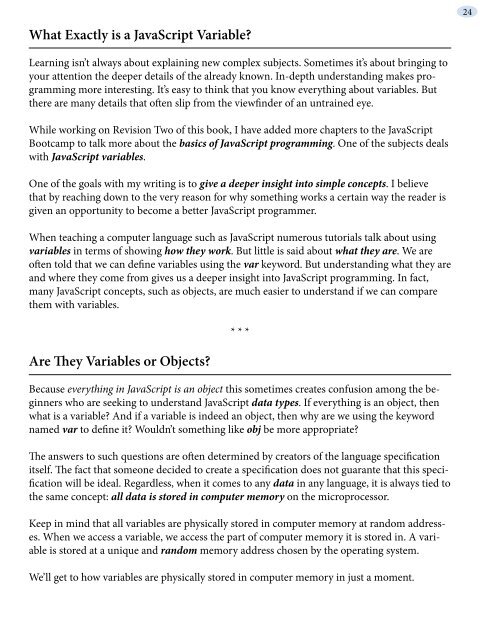hide - Understanding jQuery
hide - Understanding jQuery
hide - Understanding jQuery
You also want an ePaper? Increase the reach of your titles
YUMPU automatically turns print PDFs into web optimized ePapers that Google loves.
What Exactly is a JavaScript Variable?<br />
Learning isn’t always about explaining new complex subjects. Sometimes it’s about bringing to<br />
your attention the deeper details of the already known. In-depth understanding makes programming<br />
more interesting. It’s easy to think that you know everything about variables. But<br />
there are many details that often slip from the viewfinder of an untrained eye.<br />
While working on Revision Two of this book, I have added more chapters to the JavaScript<br />
Bootcamp to talk more about the basics of JavaScript programming. One of the subjects deals<br />
with JavaScript variables.<br />
One of the goals with my writing is to give a deeper insight into simple concepts. I believe<br />
that by reaching down to the very reason for why something works a certain way the reader is<br />
given an opportunity to become a better JavaScript programmer.<br />
When teaching a computer language such as JavaScript numerous tutorials talk about using<br />
variables in terms of showing how they work. But little is said about what they are. We are<br />
often told that we can define variables using the var keyword. But understanding what they are<br />
and where they come from gives us a deeper insight into JavaScript programming. In fact,<br />
many JavaScript concepts, such as objects, are much easier to understand if we can compare<br />
them with variables.<br />
Are They Variables or Objects?<br />
* * *<br />
Because everything in JavaScript is an object this sometimes creates confusion among the beginners<br />
who are seeking to understand JavaScript data types. If everything is an object, then<br />
what is a variable? And if a variable is indeed an object, then why are we using the keyword<br />
named var to define it? Wouldn’t something like obj be more appropriate?<br />
The answers to such questions are often determined by creators of the language specification<br />
itself. The fact that someone decided to create a specification does not guarante that this specification<br />
will be ideal. Regardless, when it comes to any data in any language, it is always tied to<br />
the same concept: all data is stored in computer memory on the microprocessor.<br />
Keep in mind that all variables are physically stored in computer memory at random addresses.<br />
When we access a variable, we access the part of computer memory it is stored in. A variable<br />
is stored at a unique and random memory address chosen by the operating system.<br />
We’ll get to how variables are physically stored in computer memory in just a moment.<br />
24


